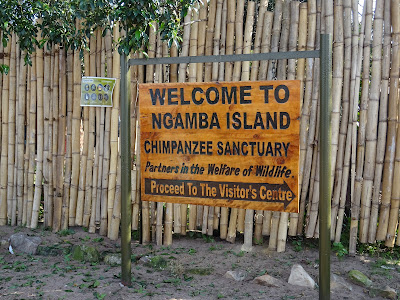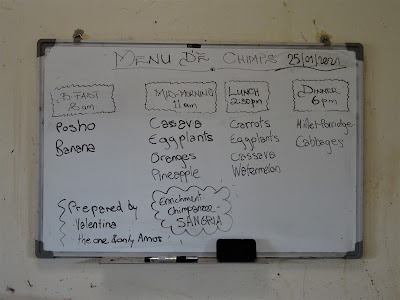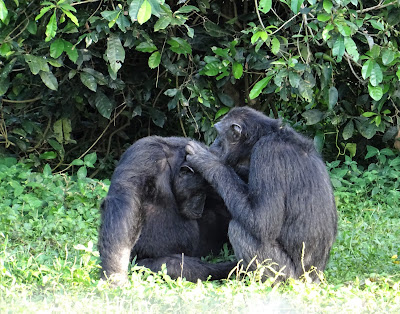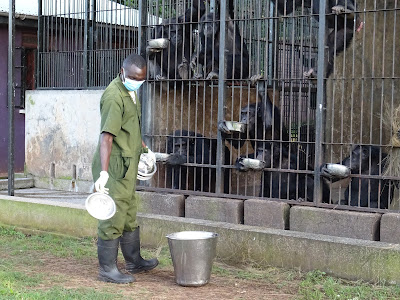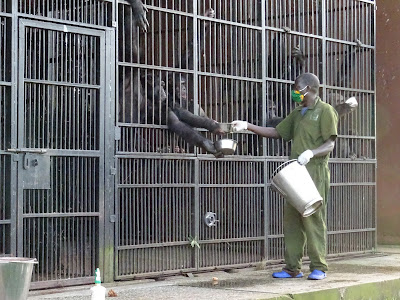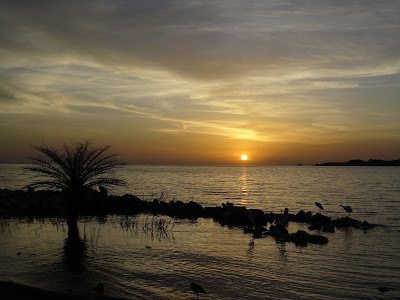This post was especially hard for me to write. Not because it's a very complex topic, but because it's about something that really matters to me. A matter of the heart that I would love to share with everyone in the hope that you will be as inspired as I am and start supporting with me our closest relatives - the chimpanzees. That's why it took some time to write about the unforgettable week at Ngamba Island in Uganda, where I lived and worked as a volunteer among the staff members and 50 orphaned chimpanzees a few weeks ago. Here are my memories.
Background
I don't remember when I fell in love with great apes, and chimpanzees especially. Maybe it was the zoo visit around 20 years ago, when a primatologist explaining us everything about chimpanzees, maybe it was the documentaries about Dr. Jane Goodall that sparked this fascination in me. The more I learnt about chimpanzees the more fascinated I became (oh, and the more apes I saw walking on the street, but that's a little secret...). So it was pretty clear to me that one day I will have to go and to study their behavior. This dream, I was able to fulfill now. I was lucky that it worked out during these difficult times of Covid-19. There were some restrictions for my work with the chimpanzees, but nevertheless I learnt so many things that I will treasure forever.
What is Ngamba Island Chimpanzee Sanctuary?
The Ngamba Island Chimpanzee Sanctuary in Uganda is located on a beautiful island in Lake Victoria, about 100 acres big. It can be reached from Entebbe in 45 minutes by speed boat and was established in 1998 with the idea to serve as a new home for chimpanzees that had been rescued from the illegal wildlife trade and could not be released back to the wild.
95 acres are forested and serve as habitat for the 50 chimpanzees. The rest is used for staff quarters, visitor facilities (e.g.a shop, an education center, bungalows to overnight and a viewing platform) and a holding facility for the chimps to spend the night in if they wished to.
The sanctuary is run by the Chimpanzee Trust, a non-government organization with the mission to sustainably conserve chimpanzees in their natural habitats and to provide the best care to them.
Why are chimps so fascinating?
Chimpanzees seem to fascinate a lot of people. But why exactly? It probably is because they are so much like us.
I would like to briefly give you some interesting facts you probably haven't known yet.
- Chimpanzees share 98,7 % of their DNA with humans, which makes them closer to humans than gorillas. We are family!
- They are highly intelligent and are gifted in the art of bluff and intimidation and can express emotions like joy, anger, grief, boredom and many others
- Chimpanzees are highly social and can live in big communities of 20 - 100 individuals. They comfort each other by grooming, kissing and embracing. Mothers are extremely caring and teach their kids the complex rules of society but also play with them a lot (e.g. tickling).
- They can live up to 50 years of age
- They have amazing tools of communication, e.g. they use the treetrunks to deliver informations by knocking on the trunks
- Jane Goodall discovered that they use tools to catch termites, to open nuts or for drinking water
But: Sadly, chimpanzees are in big danger and are facing extinction at an alarming rate. Why is that?
- Forest destruction: Chimpanzee totally depend on the forest for their survival
- Snaring: Even if snare hunting is illegal in Uganda, it's still common and in some sites, 25 % of the chimpanzees suffer from snare injuries
- Bushmeat trade: In some parts of Africa, chimpanzee meat is a delicacy
- Pet trade: As cute as chimpanzees are, as high in demand they are to have as a pet. That's why chimpanzees are still illegally brought and sold for the pet trade. But without the companionship of other chimpanzees and the wrong environment, a chimpanzee will not survive long.
Finally - my volunteer week with the chimpanzees
My adventure started when I jumped into the full-packed boat, not knowing what would expect me exactly. On the boat with me were some staff members and enough food for the staff and 50 chimpanzees for the next 10 days.
When I arrived at the island, the first thing I noticed was the incredibly intense chirping of birds. I spotted the tree where the sound came from - a tree full of yellow weaver birds, all busy building their nests. The atmosphere was magical and I immediately felt that I had arrived at the right place.
I was welcomed very warmly by the whole team. Amos, one of the caregivers, immediately took care of me and showed me around the island. As I would find out later, we would be a great team during the whole week.
Weaver birds were not the only interesting inhabitants on the island. Ngamba Island is home for monitor lizards, fruit bats, otters, a big variety of birds and many others. Often I just sat in the little hut called "the hide" and observed the wildlife. There was a lot to see!
 |
| "The hide" - the perfect place to spot wildlife |
I quickly was introduced in the daily schedule of a caregiver and was very happy to start working.
Every morning, the whole team gathered at 6:30 a.m. for a morning meeting.
Then, we headed to the food store and decided what would be on the menu of the day. As the fruit and vegetables for the. chimps could not be stored in a cool place, choosing the menu took it's time as we had to decide which fruits were ripe already and which ones could make it a bit longer. Then we started preparing the food - washing, cutting, dividing it into big buckets. I probably was pretty clumsy with the big butcher knife at first, but after a week I got more skilled and really enjoyed it! Of course, also because I was allowed to enjoy a piece of fresh jackfruit or watermelon from time to time! No comparison to the things we eat in cans here!
The chimps are fed four times a day (8 and 11 a.m., 2.30 and 6 p.m.). Shortly before breakfast, they are released from the holding facility where most of them had slept. The holding facility is connected to the feeding area and the forest by a big corridor and I always loved to observe the walk of the 50 chimps when they came back for dinner in the evening. It reminded me somehow of a March in a superhero movie when they slowly but steadily passed me to get to their night quarter.
While the chimpanzees spend most of their day in the forest, most of them come back voluntarily to the feeding area to enjoy the provided food. Most of them also return to the enclosure for dinner and to spend the night in one of the hammocks in there. Every night, they get some straw to build a nest high up in the hammocks. That's what they are used to do in the wild.
 |
| The viewing platform from where the chimps are fed |
Feeding the chimps was one of my favorite tasks. Standing on the viewing platform and throwing food over the fence was a lot of fun - and during this activity I had the chance to observe their behaviors. Incredible, how clever they requested food (e.g. by reaching their hand or vocal sounds, just like we do) and how they preferred specific types of food. Watermelons for example were much more loved than eggplants - totally understandable, isn't it? But also group dynamics became quite obvious here. Absolutely fascinating!
Soon after the feeding sessions, the chimps disappeared into the forest again. But they were always back on time for the next meal!
Some other activities I did was preparing enrichment for the chimpanzees in order to give them something exciting, out of the ordinary schedule, to make them using their skills and their brain. That's why we for example prepared some "Chimp Sangria": fruits and vegetables, cut into small pieces and then put into a plastic bottle, filled up with water and put in the freezer. The chimps were very interested in this strange looking, but yummy cocktail - and it was interesting for me to observe the different ways they tried to solve the problem and to get the food out of these bottles! All my observations I wrote in the so called "book of observation".
Even if the schedule was set and there was always something to do, I had a lot of time to observe the chimps and to study their behavior. I also loved to join the caregivers for their scanning sessions, a task that they do several times a day to observe every chimp in order to find out if everything is ok and to make notes about their behavior. It often reminded me of the doctor's visit in hospital when the mental & physical wellbeing of the patient is discussed. To see the dedication of the caregivers when they talked about the chimps was very touching - and also the way they treated the chimps or spoke to them. Just like friends, like equal beings. For me, it was just like a big family. The chimps, the staff and me.
What really touched me was to see that every chimpanzee has an individual personality. Some of them are quiet and peaceful, others are louder, some have specific "tics". It reminded me so much of us humans!
After some days I was able to tell some of them apart just by their look, their place to sit or their behavior. It was amazing.
I loved the chimps more with every day that I knew them. Maybe also because I learnt a lot about their history. You can imagine that life as an orphaned chimp was not easy and that everyone of them has it's own difficult past. Some of them have lived in circuses, private homes, prison-like conditions and much worse. While many of the chimps first had problems to integrate into the group, showed signs of depression or had behavioral issues, almost all of them have finally managed to adapt and seem to be happy and thriving.
Besides the stories of their difficult past, I loved to hear the funny story of those chimps. For example Sunday, better known as the boat captain. He had originally been sold illegally to a Russian circus and had travelled all over Europe before he was being confiscated and returned to Uganda. But somehow he seems to not have lost his wanderlust, as he one day escaped the enclosure, jumped into a fishing boat and was found "rowing in the lake" by people from the neighboring island.
 |
| Sunday, the boat captain (photo retrieved rom friendsofchimps.org) |
Or Tumbo, the chimp that looks older that he is but is known to be a very diplomatic chimp, quiet, a natural leader and peacemaker whenever there is trouble.
 |
| Tumbo, the diplomat (photo retrieved from friendsofchimps.org) |
Another task that had to be done was to clean the holding facility every morning. Believe it or not, I loved this work. As an office person, I loved to be on the move and to do physical work. The caregivers made it easy for me as they always put on very good music and the mood was always cheerful and happy.
Oh, and talking about physical work. I also got a crash course in gardening and we set up a Switzerland against Uganda challenge. I would have lost it obviously, but the caregivers were so charming to let me win. It was a lot of fun and laughter - oh, and off course a little bit of sweat too.
Another highlight was the dinner feeding when the chimps returned to the holding facility. The way they ate their porridge out of the bowl and then politely return the bowl was always great to experience.
One personal highlight of the week was the boat cruise we did to see the chimps in the forest. We drove around the island, some bananas packed and ready for the chimps. Off course they noticed the boat sounds very quickly and were already waiting for us when we arrived on the other side.
The week went by much too fast and at the day when I had to leave the island, it felt completely wrong. Too early. I felt like leaving my family and friends. It was hard to say goodbye. And somehow, even after some weeks, it feels as if my heart is still on the island.
A big thank you to the whole Ngamba team for integrating me into your family and for showing me so many important things.
And thanks to the chimps for teaching me so much about themselves - and about myself as well.
This definitely wasn't the last time I was on the island.
Pant-hoots from Switzerland,
Valentina, 98.7 % chimpanzee
 |
| The fantastic staff of Ngamba Island Chimpanzee Sanctuary had just received the Shinning World Compassion Award |
The current situation during the SARS CoV-2-crisis
The sanctuary was hit hard by the current Covid-crisis. In March 2020, they had to close the sanctuary for an unknown amount of time. It is not known if great apes can be affected with the disease, but given the close genetic relationship it was off course the safest option. Only essential staff remained on the island to care for the 50 residents and they had to put in place extra measures to protect both staff and chimps, e.g. by wearing masks and gloves and regular disinfection. All activities that involved direct contact with the animals had to be stopped.
But if that wasn't enough, the sanctuary had another problem to handle: the consequences of climate change led to rising lake levels and uncontrollable flooding. The shoreline eroded and infrastructure was destroyed.
The costs that these disasters cause can only be imagined. Today the island is open again, but due to the continuing restrictions, tourism is very low. The sanctuary, the staff and the chimpanzees critically depend on support from abroad to be able to continue their dedicated and so important work.
A personal note - and a call for help
I fulfilled me dream of being close to the chimpanzees and to learn more about them in one of the most difficult times the sanctuary has ever faced. But instead of despair and hopelessness, I felt above all an incredible dedication of all the staff members to care about their friends and family members, the 50 chimps. I never felt more welcome anywhere in the world than here, was integrated immediately in the family and quickly made new friends - within people and chimpanzees.
Learning about the individual characteristics of the chimps, learning about their difficult history and seeing how they are thriving now made me realize the value of a place like Ngamba Island.
So please, if my post has inspired you, please make sure you let the chimps and the Ngamba staff know and support our closest relatives - every donation is highly appreciated. THANK YOU!
----------------------------------------------------------------
HERE IS HOW YOU CAN SUPPORT:
--> Or would you like to see a short documentary about the island in German language with Felix, son of caregiver Amos and a talented actor? Click here for the video --> Link
--> And make sure you check out the website of the "Friends of Chimps" organization too. They also support the sanctuary and are doing an amazing job --> Link
----------------------------------------------------------------
"And don't you forget the hardships you may meet as you travel within the African continent and into the forest, are helping to preserve some of the most amazing ecosystems and some of the most remarkable creatures in the world."
(Dr. Jane Goodall)


